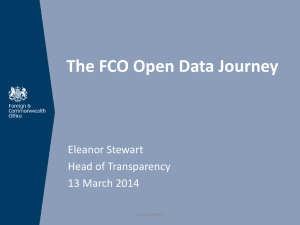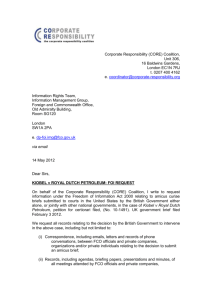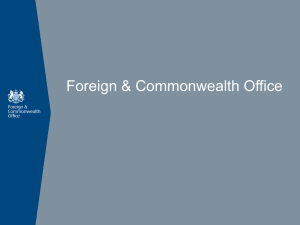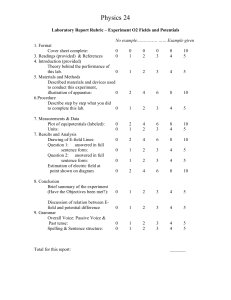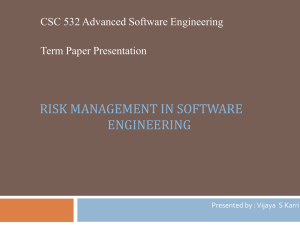Consultation on amending the British Nationality Act
advertisement
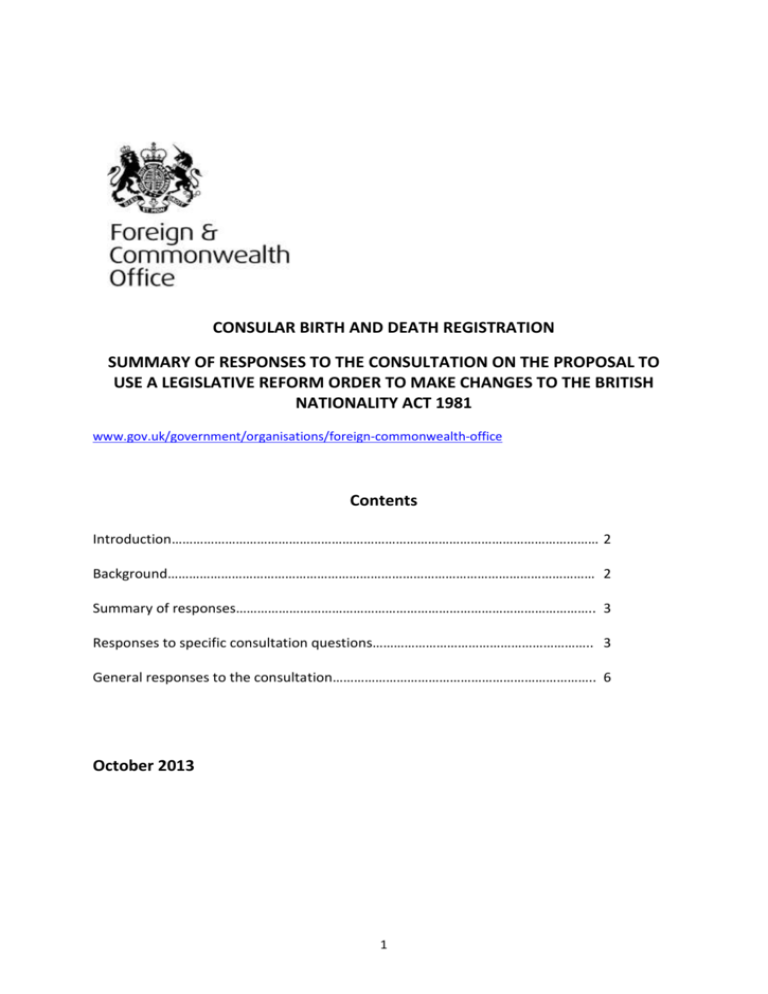
CONSULAR BIRTH AND DEATH REGISTRATION SUMMARY OF RESPONSES TO THE CONSULTATION ON THE PROPOSAL TO USE A LEGISLATIVE REFORM ORDER TO MAKE CHANGES TO THE BRITISH NATIONALITY ACT 1981 www.gov.uk/government/organisations/foreign-commonwealth-office Contents Introduction………………………………………………………………………………………………………… 2 Background………………………………………………………………………………………………………… 2 Summary of responses……………………………………………………………………………………….. 3 Responses to specific consultation questions…………………………………………………….. 3 General responses to the consultation……………………………………………………………….. 6 October 2013 1 Introduction This document contains a summary of responses to the consultation to seek views on the Foreign and Commonwealth Office’s (FCO) proposal to use a Legislative Reform Order (LRO) to make changes to the British Nationality Act (BNA) 1981. Changing the Act will allow the FCO to change the way births and deaths of British Nationals overseas are registered. The formal 12 week public consultation commenced on 19 July and ended on 11 October 2013. The FCO published its consultation document on www.gov.uk and separately sought views from stakeholders including other government Departments with an interest in birth and death registrations. This document outlines the Government’s proposed next steps. Background Current regulations oblige the FCO to register births and deaths overseas of qualified British Nationals when asked. There are differing procedures for British Nationals wishing to register a birth and death, depending on the country where the event took place. Most can be registered in the country of birth or death, and registrations are made locally in 130 overseas consular Posts. Additionally, next of kin resident in the UK or in another country may apply direct to the FCO in London or to their nearest British Embassy or High Commission, who then forward the application to the Embassy or High Commission in the country where the event took place. In addition, the FCO in London registers events that take place in 25 countries where the UK either has no diplomatic representation or where there are no Consular Registration Officers. The FCO is seeking to centralise its consular birth and death registration service into a new unit to be set up in the UK. A central unit with suitably trained and qualified staff, handling all applications from British Nationals overseas, would reduce a number of risks and provide an efficient and coherent global service for customers, including a common on-line application procedure and credit card payment facility. The FCO proposes to amend the British Nationality Act (BNA) 1981, specifically those parts that deal with the registration of births and deaths overseas. Changes are needed to allow the FCO to discontinue consular registrations of births and deaths overseas and establish a single specialist unit in the UK to register births and deaths centrally. This proposal will affect British Nationals resident either in the UK or overseas who wish to apply for a consular birth or death registration. Section 41(1) (g) to (i) of the BNA provides for regulations to be made enabling births and deaths overseas to be registered. The relevant regulations are the Registration of Overseas Births and Deaths Regulations 1982. Section 41 of the BNA limits the regulation-making power in such a way that registration must be done overseas. Amending these provisions would allow the FCO to make subsequent amendments to the 1982 Regulations and allow the FCO to establish a central consular birth and death registration unit in the UK, responsible for registering all consular births and deaths for British Nationals overseas. The FCO proposes to amend the BNA by means of a Legislative Reform Order (LRO). 2 Summary of responses The FCO is grateful to all those who participated in this consultation and is grateful for all the responses received. We consulted seven Government Departments who have an interest in our plans: UK Immigration and Visas General Register Office for England and Wales National Records of Scotland General Register Office for Northern Ireland Ministry of Justice Home Office Ministry of Defence We published our consultation on www.gov.uk, and sent weekly tweets from the FCO’s Travel Advice twitter account (over 47,000 followers) to promote our consultation. We also contacted 18 expat organisations in the countries with the most demand for consular birth and death certificates. A number of these agreed to publish information about the consultation to their members, including on their websites or through their newsletters: Expat Forum St. George’s Society British Community Committee, France British Chamber of Commerce, Japan Age Concern, Costa Blanca, Spain British Residents Association of Switzerland Pattaya City Expats Club, Thailand In addition, our Embassy in Dubai gave a short radio interview on the consultation, and a short article was published in a local expat newspaper in the UAE. We received seven responses to the consultation, of which three included a completed online questionnaire which the FCO posted on the gov.uk website as part of its consultation document. - Responses to specific consultation questions: Q1. Do you support the proposal to centralise the consular birth and death registration service into the UK? All respondents answered yes. One suggested that further clarification was needed. A second raised the points that the total cost to the customer should not increase; there should be a local contact to help resolve questions over supporting documents; and translation of documents would be an issue. A third stated that an on-line centralised system would be preferable to having to travel to the British Embassy. 3 Q2. Do you support the proposal to amend the British Nationality Act 1981 accordingly, in order for the birth and death registration service to be centralised? All respondents answered yes. One suggested that further clarification was needed. One noted that a similar centralisation for passport issuing had helped considerably. Q3. Do you think the proposal will remove or reduce burdens? Two respondents answered yes – providing that as much as possible is done online, and specialised staff are appropriately trained. One respondent replied no – the current system serves the public well and personal interaction with consular staff would be lost. Q4. Do you think there are any non-legislative means that would satisfactorily remedy the difficulties which the proposals are intending to address? Two respondents answered no. One answered yes, by modifying Option 3 in the Impact Assessment (London to provide nationality determinations, and overseas posts to make register entries). The applicant could provide documents to the local consulate for approval, providing assistance if needed to the applicant, with the centralised process completely online. Q5. Are the proposals put forward in this consultation proportionate to the policy objective? Two respondents answered yes, one acknowledging that a change of law is required to make a minor change to allow centralisation. One respondent answered ‘don’t know’. Q6. Do the proposals put forward in this consultation document taken as a whole strike a fair balance between the public interest and any person adversely affected by it? One respondent answered yes –a central office of trained specialists may help ensure correct nationality determinations. One respondent responded no, and commented on a lack of clarity over issues that may arise regarding specific regulations in the country of residence, if these interfered with the UK registration process. One respondent commented that it would be impossible to say as the consultation document may have underestimated the problem of internet access in remote parts of the world. Q7. Can you identify any necessary protections which would be reduced or lost as a result of the proposals? If so, are they needed and how could they still be provided? Two respondents answered no. One respondent answered yes – consulates can currently provide supporting letters for applicants if local authorities need clarification of documents. A new system would require some flexibility and understanding of local requirements. 4 Q8. Do the proposals put forward in this consultation prevent any person from continuing to exercise any right or freedom, which they might reasonably expect to continue to exercise? Two respondents answered no. One respondent answered yes – a potential lack of consular support to handle registrations with understanding of the local language. Q9. Do you agree that the proposed changes do not have a significant financial impact as set out in the Impact Assessment? One respondent answered yes – changes may have a positive impact. One respondent answered no – there would be a financial benefit for the FCO, but extra courier and translation costs for the customer were likely to be much higher. One respondent didn’t specifically answer, but stated that the proposal had only a vague undertaking to investigate possible savings to the public, and it seemed to be a cost-cutting exercise for HM Treasury. Q10. Do you broadly agree with the cost estimates, assumptions and conclusions of the Impact Assessment? Two respondents answered yes – one expanded that customer costs should be considered more carefully. One respondent didn’t specifically answer, but noted the lack of clear cost information. Q11. Do you agree that the proposed negative Parliamentary procedure as outlined in chapter 5 should apply to the scrutiny of these proposals? All respondents answered yes. One expanded, noting that modern communication technology is radically different from when the BNA came into being, and a negative Parliamentary procedure was appropriate for the proposed relatively minor administrative change required. Q12. Do you have any further comments in relation to the proposal? We received two replies to this question: - - Agreement to the proposal stems from the fact that the service currently provided by the FCO in the respondent’s country is minimal, so online centralisation would be a benefit. If one of the reasons for change is the risk of mistakes, then a solution could be better training. The respondent noted that lack of training could be linked to an overall Whitehall drive to cut costs at the expense of reduced personal service. 5 - General responses to the consultation In addition to the three completed response forms, we received four e-mails with general comments: - Option 1 (centralise FCO’s consular birth and death registration service) would be a good way forward, particularly an immediate service without the need for an appointment. Making part of the service electronic could reduce criminal activities. - No reason why registration could not be done by a single organisation in the UK. A specialised office/database could also be introduced for death registrations in France and Spain, given the large number of British nationals retired there. This could provide a UK certificate based on the foreign one. Staff would only need to be familiar with French/Spanish certificates and translations. This could be part of a reciprocal arrangement with France/Spain. - This is another cost saving measure. Mistakes and fraud are likely to increase with the removal of local knowledge and experience and an insecure online application system. Nationality decisions for overseas passport and birth registrations are performed by separate teams, therefore repatriation of passports would not increase the likelihood of nationality mistakes. - This is simply a proposal to save money overseas and further reduce British Embassy service to expats. 6
